The "Hunters of Brussels"
Borremans, a brewer's son, aged 26, who originated from the area around the Old Grain Market Square in the centre of Brussels, had gathered a group of more or less 200 ‘Hunters of Brussels’ volunteers around him between the riots that took place in the month of August 1830 and the fights of 24 September. The Hunters found shelter in the barracks of the fire brigade situated in the district of the Old Grain Market Square. After his group had participated in the fights of the 22 and 23 September and in the fight for the public park of Brussels, where the army of the United Kingdom of the Netherlands had set up camp, they were recognised as "regular" troops on 27 September by the provisional government established by the rebels. The ‘Hunters of Brussels’ were the first infantry unit to be incorporated into the new army. On the same day this unit was expanded to include 200 volunteers from the region of Ath. Borremans rose quickly through the ranks to head this corps; advancing in rank to become a major on 28 September and by 5 October had become a lieutenant colonel. Meanwhile, the corps had officially acquired the title "Hunters of Brussels"; numbering some 450 men grouped in six companies and a staff. The Hunters wore an authorised uniform that consisted of a blue tunic, a lumbar ribbon, and a black police hat with a tricolor rosette. On 1 November, the provisional government issued a decree establishing the 1st Regiment of Hunters on foot, of which Borremans' Hunters of Brussels constituted the core. The decree was confirmed by the National Congress of Belgium, the temporary legislative institution tasked with the development of a new constitution which was ratified by the first assembly on 10 November. It is only on 25 February 1831 that Borremans, then colonel, effectively got command over this huddle, grouped in two battalions that had grown to some 950 agitators. Brussels became for these poor wretched soldiers the main seat, where they had to secure the city and maintain order.
Resistance by the Orangists
When it became obvious that the provisional government and the National Congress, established by the southern rebels after having overthrown the legitimate regime in this part of the Kingdom, were incapable of generating any credibility either with the press or with the intimidatory French schemers who were dedicated to agitating loudly in the public gallery during gatherings of the Congress occupied with drafting the new constitution and with the candidacy to the Belgian throne of the Duke of Nemours, son of the new king of France, Louis-Philippe, the Orangist faction in the southern part of the Netherlands was able to easily increase its public support. The Orangists created a network that was able to re-establish the legitimate regime, a network in which were represented, among others, the former Minister Gobbelschroy, an industrialist from Liège John Cockerill, the commander of the troops of the provisional government in Bruges Ernest Grégoire, the chief of the home guard Baron Emmanuel d‘Hoogvorst and his brother Joseph, Charles Morel and the Generals Goblet and Van der Smissen. Faced with the ineffectiveness of the new administration, Colonel Borremans decided to join this network of resistants. For the Orangists, the decision to revolt was caused when Minister Alexandre Gendebien founded, on 23 March 1831, the day of his resignation, the National Association - a clique orientated towards France that, if it did not succeed in spite of all its scheming in getting Belgium annexed by France, strived all the same to reduce the Southern Netherlands to a satellite state of the Kingdom of Louis-Philippe. The Association decided to organise a meeting on 24 March at the Vauxhall in Brussels’ public park. As one of the measures to liberate the country, the Orangist's network decided to send Colonel Borremans, Chief of the Hunters and Brussels born, to the public houses to recruit partisans to disrupt the meeting of the Association. The Colonel was regarded as imprudent when he pleaded openly for the return of the Prince of Orange, the future Willem II of the Netherlands, and proved to be incapable of warding off the empty but impressive rhetoric of the leaders of the Association. As his persuasive strength had eluded him, he and is adherents had to leave the meeting without having achieved any success. As the military intervention had not yet taken place, Colonel Borremans had to find some sympathisers in his district of the Old Grain Market Square the next evening to support the insurrection. The Colonel was in a state of despair after the failure of the previous day which made him surrender to the police of the new government, which of course was a disaster for the Orangist party. The English Envoy, Lord Ponsonby, then recommended that the Orangists cancel their counter coup. Most members of the resistance were able to escape, but Colonel Borremans was summoned before a Military Court and convicted. On 31 May 1831, he was stripped of his military ranks by a superior Military Court due to "the non denunciation of a plot against the security of the Belgian state". His conviction led to anti-Orangist riots. The regiment itself had been transferred to Aalst - Dendermonde. Borremans, having always denied the accusations, was pardoned on the occasion of the marriage of Leopold I, who meanwhile had accepted the throne of the Belgian Kingdom. Borremans was freed from gaol only in September 1832.

William I was King of the Netherlands and Grand Duke of Luxembourg from 1815 until his abdication in 1840.

The United Kingdom of the Netherlands is the unofficial name given to the Kingdom of the Netherlands as it existed between 1815 and 1830. The United Netherlands was created in the aftermath of the Napoleonic Wars through the fusion of territories that had belonged to the former Dutch Republic, Austrian Netherlands, and Prince-Bishopric of Liège in order to form a buffer state between the major European powers. The polity was a constitutional monarchy, ruled by William I of the House of Orange-Nassau.
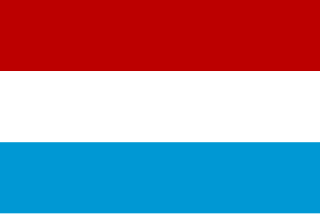
The United Provinces of the Netherlands, officially the Republic of the Seven United Netherlands, and commonly referred to in historiography as the Dutch Republic, was a confederation that existed from 1579 until the Batavian Revolution in 1795. It was a predecessor state of the present-day Netherlands. The republic was established after seven Dutch provinces in the Spanish Netherlands revolted against Spanish rule, forming a mutual alliance against Spain in 1579 and declaring their independence in 1581. It comprised Groningen, Frisia, Overijssel, Guelders, Utrecht, Holland and Zeeland.

Leopold I was the first king of the Belgians, reigning from 21 July 1831 until his death in 1865.
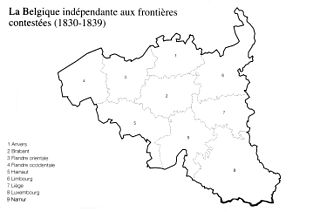
The Treaty of London of 1839, was signed on 19 April 1839 between the Concert of Europe, the United Kingdom of the Netherlands and the Kingdom of Belgium. It was a direct follow-up to the 1831 Treaty of the XVIII Articles, which the Netherlands had refused to sign, and the result of negotiations at the London Conference of 1838–1839.
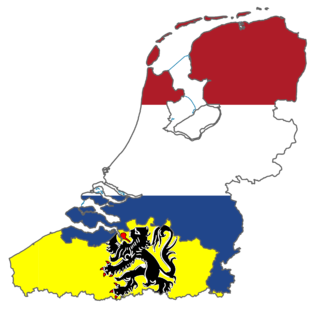
Greater Netherlands is an irredentist concept which unites the Netherlands, Flanders, and sometimes Brussels. Additionally, a Greater Netherlands state may include the annexation of the French Westhoek, Suriname, formerly Dutch-speaking areas of Germany and France, or even the ethnically Dutch and/or Afrikaans-speaking parts of South Africa, though such variants are mostly limited to far-right groups. A related proposal is the Pan-Netherlands concept, which includes Wallonia and potentially also Luxembourg.

The Belgian Revolution was the conflict which led to the secession of the southern provinces from the United Kingdom of the Netherlands and the establishment of an independent Kingdom of Belgium.
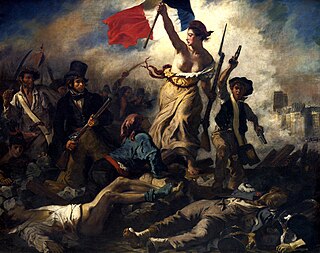
The Revolutions of 1830 were a revolutionary wave in Europe which took place in 1830. It included two "romantic nationalist" revolutions, the Belgian Revolution in the United Kingdom of the Netherlands and the July Revolution in France along with rebellions in Congress Poland, Italian states, Portugal and Switzerland. It was followed eighteen years later, by another and much stronger wave of revolutions known as the Revolutions of 1848.

Étienne Constantin, Baron de Gerlache was a lawyer and politician in the United Kingdom of the Netherlands, and later became in 1831 the first prime minister of the newly founded Belgian state.
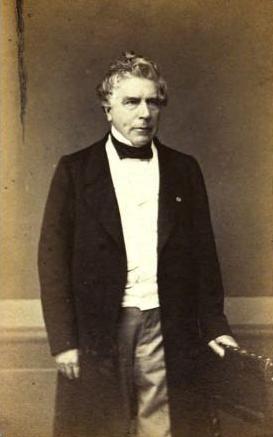
Charles Latour Rogier was a Belgian liberal statesman and a leader in the Belgian Revolution of 1830. He served as the prime minister of Belgium on two occasions: from 1847 to 1852, and again from 1857 to 1868.
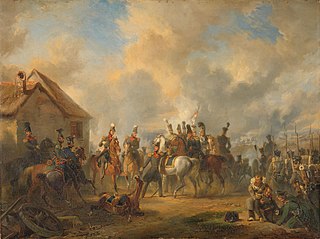
The ten days' campaign was a failed military expedition by the United Kingdom of the Netherlands against the secessionist Kingdom of Belgium between 2 and 12 August 1831. The campaign was an attempt by the Dutch King William I to halt the course of the Belgian Revolution which had broken out in August 1830.

The National Congress was a temporary legislative assembly in Belgium, convened in 1830 in the aftermath of the Belgian Revolution. Its purpose was to devise a national constitution for the new state, whose independence had been proclaimed on 4 October 1830 by the self-declared Provisional Government.
The Eight Articles of London, also known as the London Protocol of 21 June 1814, were a secret convention between the Great Powers: the United Kingdom, the Kingdom of Prussia, the Austrian Empire, and the Russian Empire to award the territory of current Belgium and The Netherlands to William I of the Netherlands, then "Sovereign Prince" of the United Netherlands. He accepted this award on 21 July 1814.

Alexis Michel Eenens was a Belgian lieutenant-general, military historian, and politician.
Orangism was a political current in what is now Belgium that supported its inclusion in the short-lived United Kingdom of the Netherlands (1815–1830). After the secession of Belgium in 1830, Orangist sentiment in Flanders and Wallonia for a time sought a restoration of the United Kingdom of the Netherlands. It was a movement directed by William I of the Netherlands as part of his "Volhardingspolitiek" and containing most of the Belgian elites. Some of the most prominent Flemish Orangists were Jan Frans Willems and Hippolyte Metdepenningen. Although refusing to participate in parliamentary elections, as they deemed Belgian national institutions to be illegitimate, the Orangists did take part in local elections at the provincial and municipal levels, from which they militated against the new Belgian state through political actions and an activist press. At least three Orangist coups were foiled during the 1830s. Although losing Dutch financial and political support after the Treaty of London (1839) and William I's abdication (1840), the weakening Belgian Orangism survived well into the 1850s, strongly opposing the Belgian Revolution and rallying against independence.
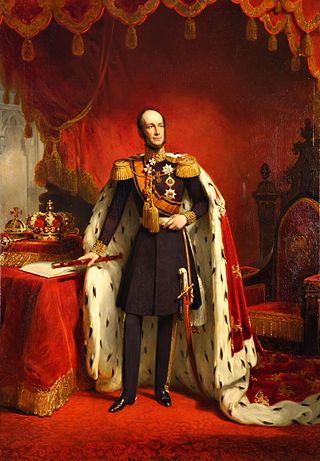
William II was King of the Netherlands, Grand Duke of Luxembourg, and Duke of Limburg.

Belgian National Day is the national holiday of Belgium commemorated annually on 21 July. It is one of the country's ten public holidays and marks the anniversary of the investiture of Leopold I as the first King of the Belgians in 1831.

The Sovereign Principality of the United Netherlands was a short-lived sovereign principality and the precursor of the United Kingdom of the Netherlands, in which it was reunited with the Southern Netherlands in 1815. The principality was proclaimed in 1813 when the victors of the Napoleonic Wars established a political reorganisation of Europe, which would eventually be defined by the Congress of Vienna.

In the history of Belgium, the period from 1789 to 1914, dubbed the "long 19th century" by the historian Eric Hobsbawm, includes the end of Austrian rule and periods of French and Dutch rule over the region, leading to the creation of the first independent Belgian state in 1830.

Léandre Joseph Antoine Desmaisières was a Belgian politician.

















